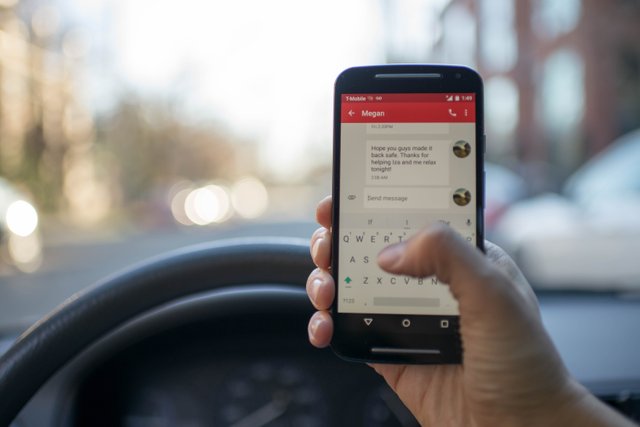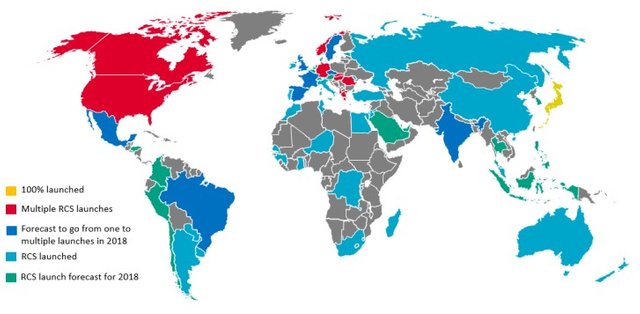
“MERRY CHRISTMAS”. Don't worry, this is not a reference to the gone holidays. It was this text that was used on December 3, 1992, when the world's first SMS (Short Message Service) was sent. Remember when you sent your first text message and what was it like? If mobile networks have once lived until the fifth generation, is it not time to replace the SMS standard with what is more modern? It turns out that Google has been trying to implement the RCS (Rich Communication Service) for some time, therefore, in this post I will tell you what it is, why we will most likely face with it in the future and what the problems with that are.
History lesson.
Despite the limitations, SMS is still a very popular protocol. SMS uses 3.5 billion active users. At a time when we no longer count the number of sent messages, we can combine 160 character messages with longer messages and use more complex symbols. However, nowadays, bare text alone is not enough. Communication without multimedia is no longer imaginable.
The next step in development would be the EMS (Enhanced Message Service). EMS allowed to format text, insert graphical symbols and even small pictures. As EMS was based on SMS, it meant that the improved service sent several text messages, which later produced improved messages. For example, a 32 x 32 pixel picture took a whole SMS message. Everything was cool, but even then, we had to list and think about the text messages or be able to afford the attractive EMS. The development of color screens led to the thought of sending pictures, photos, animations, even video, so MMS (Multimedia Messaging Service) was created. The era of smart phones has brought with it the development of various communication applications. Whatsapp, Viber, WeChat and countless Asian chat apps are based on the available data connections because either text and media are sent with the application. And here we come to RCS (Rich Communication Service).
Rich Communication Service.
The beginnings of RCS date back more than ten years, when the GSM standard laid the foundation for the new standard. Ten more would probably be needed if Google had not been actively involved in the project. The project envisages replacing the SMS protocol with a new one, which would essentially offer the communication capabilities offered by the most popular communication applications - chat, group chat, multimedia messaging, video calls and other, which Whatsapp, FB Messenger, Viber or many others are already existed in other communication applications. The main difference is that it will be an integrated protocol, not a separate application, so it is available to everyone, not just to the group that uses the particular application. The fact that 48 mobile phone operators, 11 phone manufacturers (Huawei, Samsung, Lg, etc.) and two operating system developers Google and Microsoft have already been involved in the project are showing the seriousness of the project.
Google takes the opportunity.
In surveys and studies, why iOS opt for Android, it is often mentioned that users do not want to leave iMessage. For the sake of competition, the introduction of RCS was seen by Google as an opportunity. Google Talk, Hangout, Allo, Duo - these are just some of the names that make up this mess, and what Google plans to solve by equipping RCS with its simple SMS application. The idea is simple - send the RCS to another contact, the operator, knowing whether the user is using RCS or not, will send either the new format message or the old good SMS if RCS is not yet in use. Attached files will be sent using data. Here I have to say that I did not know whether the service will be limited to data or will also be able to use a Wi-Fi connection. In order to implement RCS, Google has created the Jibe cloud platform, which allows not only to use this service for ordinary people, but also for companies to send for example e-tickets.
Problems and risks.
Not everything is gold that shines and Rich Communication Service also faces problems. One of the risks is privacy. As the service complies with all SMS protocol standards and application standards, the system is not encrypted as iMessage or Telegram and within the law (hopefully and depending on the state) authorities can access these data. I have no claims against it, but there is a whole lot of people who it is very important.
Apple's non-engagement in the project could be explained by the successful iMessage, which partially performs the same functions, and the content is encoded.
Summary.

What was originally intended to replace the morally obsolete standard has turned out to be a lifebuoy in the sea of Google's communication apps. And no wonder, until RCS is fully implemented, Android SMS application will become a competitor to iMessage. If you have bought Samsung or LG for the last two years, RCS support is probably already there, just waiting for the operator to implement this protocol. Have you noticed that Huawei, who always makes clones for all Google applications, recently replaced the SMS application with Google app? As Google is about to refresh this application for RCS service, it seems to be a far-sighted step. The biggest advantage I see from RCS is that now it will be possible to send almost any contact to any contact without knowing which communication application the contact is using. An exception to this is Apple, which has not yet joined the developer community.
How do you think RCS will be able to replace SMS? Will Google finally be able to compete with iMessage?
Photo source pexels.com and google.com
ESTM Boosting refund to @ingus42!
Due to one of these reasons:
1. Not posted from eSteem apps.
2. Already curated by eSteem team.
3. Need bit more improvement on quality of post.
4. Might be too old post.
5. User already received vote in last couple hours.
Android, iOS, Windows, Mac, Linux
Learn more: https://esteem.app
Join our discord: https://discord.gg/8eHupPq
Downvoting a post can decrease pending rewards and make it less visible. Common reasons:
Submit